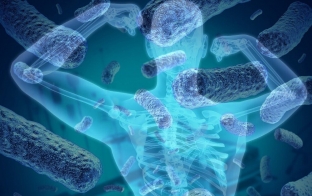For more than one hundred years, scientists have been trying to study the most amazing creation of nature – human organism. There are billions of people on planet Earth. They all wake up in the morning, eat, satisfy their physiological needs. People study the world around them, accumulate knowledge and experience, are born and die. Every day, billions of people learn something new, but at the same time they know so little about what they have to see and feel every day – own body. Do you know that it is the "home" of not only for you? Microbiologist Rob Knight wrote an amazing book "Look what's inside you", which tells about the many inhabitants of our body – microbes.
Interesting Facts About Microbes You Didn't Know Before
There are approximately ten times more microbes in the human body than all its cells. About 10 & nbsp; 000 species of tiny inhabitants exist inside our body, while their total weight – about 1.5 kilograms. Our existence on earth without microbes would be impossible. Good microbes help many important processes in the human body, such as digestion, to take place. It is surprising that a child in the womb is sterile, that is, there are no bacteria in his body, and he acquires the first portion of microbes only during his passage through the mother's birth canal.
Amazing Facts About Microbes by Rob Knight:
1. The scientist tried to compare the DNA of humans and microbes, and found out an amazing fact. There are approximately 20,000 genes in each person's body. At the same time, in our body there are from two to 20 million microbial genes. Thus, in terms of genetics, a person is 99% a microbe.
2. Each person has an absolutely unique "microbial portrait". Regardless of whether your hands rub against each other or touch the same objects, each of them has its own set of germs. Moreover, completely different "microbial populations" in the hands of different people. We each have our own unique "microbial fingerprint".
3. Microbes living in the human body protect the body from attacking itself. Simply put, our immune system, which, like other systems of the body, wants to work at full strength, therefore periodically carries out such a "cleansing" of itself, attacking microbes. If we didn't have them – the immune system would attack the cells of the body, provoking the development of autoimmune diseases.
4. Do not be afraid of small children coming into contact with germs. The more time a small person spends with other children and representatives of the animal world, the more unfamiliar microorganisms he encounters, thus hardening his immune system.

5. Science has proven that with age in the body of a healthy person, the diversity of microorganisms increases. Scientists admit that a large number of microbes plays an important role in human life expectancy. Perhaps centenarians have particularly healthy microbiomes that allow them to enjoy life for so long.
6. At the initial stage, there are studies that study the influence of microbes on the psychological state of a person. It is known that there is an inflammatory component in the pathogenesis of depression. In this condition, gut microbes produce special fatty acids that reduce inflammation. There is also evidence that the diversity of microbes in the bodies of children with autism is somewhat different from that of healthy children. Given the influence of microbes on the human body, it is possible that they play a role in the development of many diseases that we still do not even suspect.






Add a comment